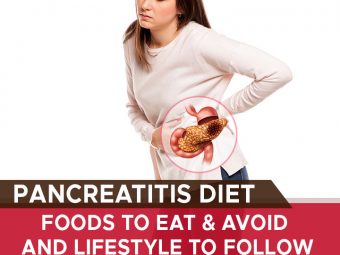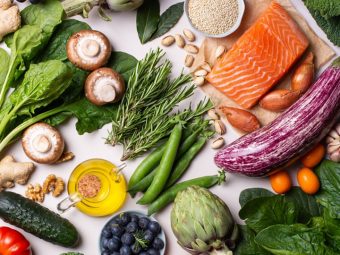[ad_1]
Dealing with an autoimmune condition can be difficult since they are incurable. But what if we told you that the right diet for Hashimoto’s disease might keep most of the symptoms at bay? You heard that right. Experts believe that avoiding certain foods along with simple lifestyle changes can lower your dependency on medications.
People with Hashimoto’s thyroiditis are often at risk of developing other conditions such as hypothyroidism, hypertension, and cardiac diseases. A gluten-free, anti-inflammatory nutritious diet supports your metabolism, prevents inflammation, improves gut health, and aids thyroid functions.
Keep reading to learn about the best diet plans for Hashimoto’s disease and recipes to manage your condition naturally.
What Is Hashimoto’s Disease?
It is a condition in which a dysfunctional immune system attacks the body’s thyroid cells, thus impairing the thyroid gland, which regulates the body’s metabolic, cardiac, and developmental activities, from producing adequate amounts of thyroid hormones. This may lead to hypothyroidism and, rarely, to hyperthyroidism (1). Hashimoto’s disease may also increase the risk of cardiovascular diseases and other bodily conditions (2).
According to studies, Hashimoto’s disease is more common among middle-aged women (30 to 50 years) than in men (1). Being an autoimmune disease, those with a family history of the condition are more likely to develop Hashimoto’s thyroiditis.
Did You Know?
Hashimoto’s disease is known to be one of the significant causes of hypothyroidism, and might be diagnosed with the following symptoms.
Symptoms Of Hashimoto’s Thyroiditis
A goiter (enlarged thyroid gland) is one of the first symptoms that mark the progress of Hashimoto’s disease. Here are a few more symptoms of the condition:
- Obesity
- Fatigue and muscle aches
- Nausea
- Hair loss
- Irregular menstruation
- Chronic hives
- Shrinking of the thyroid gland (4)
- Dryness of skin
- Slow heart rate
Hashimoto’s disease is also associated with decreased fertility and miscarriages (5). Diet plays a crucial role in maintaining immune functions. Therefore, the importance of diet in an autoimmune disease such as Hashimoto’s must not be overlooked while planning a holistic treatment.
How Does Diet Affect Hashimoto’s Disease?
According to research, a nutritious diet may delay the onset or prevent the progression of autoimmune conditions (6).
Studies also show a relationship between oxidative stress and thyroid malfunctions (7). In such cases, an antioxidant-rich diet can prevent oxidative stress-related chronic inflammation and improve an existing thyroid condition.
Further, thyroid gland malfunctions due to Hashimoto’s disease can lead to other complications such as cardiac failures, increased cholesterol levels, high blood pressure (hypertension), and myxedema (a condition that slows down vital body functions). While the incidence of these conditions may be averted with medicine, the same may be naturally managed through dietary restrictions.
Following is a brief guide to the best Hashimoto’s disease diets.
Best Diets For Hashimoto’s Disease
1. Autoimmune Protocol Diet (AIP)
What Is It?
The AIP is a two-phased diet plan that resembles the Paleolithic diet. It initially eliminates food groups that may act as antigens in the body, cause an imbalance in the gut microflora or stimulate an inflammatory response and substitutes them with nutritious foods that support the immune system. Later the eliminated groups are gradually reintroduced into the diet to identify possible trigger factors (8).
How It Works
The AIP is the most recommended diet plan for Hashimoto’s disease. Clinical data shows that nutritional modifications can improve the body’s immune responses (6, 7). AIP diet suggests including fermented foods, freshly-prepared salads, bone broth, and antioxidant-rich foods and prevents foods that trigger inflammation. These changes in one’s daily diet are an excellent approach to reducing oxidative stress-related thyroid malfunctions.
2. Anti-Inflammatory Diet
What Is It?
This diet plan is designed to combat chronic inflammatory conditions in the body (9). It encourages the consumption of various fruits and vegetables, lean proteins, omega-3 fatty acids, fiber, herbs and spices. The Mediterranean diet and the DASH diet are examples of anti-inflammatory diets.
How It Works
An anti-inflammatory diet helps regulate intestinal microbiota disorders, reduces inflammation, and may aid an existing Hashimoto’s disease condition (10).
Research suggests that changes in the gut microbiome can trigger inflammation and affect thyroid hormone production in the body (11).
3. Paleo Diet
What Is It?
This is a diet plan that mimics the diet consumed by early humans of the Paleolithic era, such as fruits, vegetables, meats, fish, nuts, and seeds. and eliminates processed food.
How It Works
The exclusion of modern-day foods that are rich in carbs, and the inclusion of ancestral foods in the Paleo diet, provide the body with various essential macronutrients that improve thyroid functions.
According to a study conducted on patients diagnosed with Hashimoto’s thyroiditis belonging to the age group of 18 years and above, the Paleo diet successfully reduced thyroid antibodies (12).
4. Gluten-Free Diet
What Is It?
A diet plan that excludes foods made of wheat, rye, oats, and barley that contain a protein called gluten.
How It Works
This diet may help decrease thyroid antibodies, which cause inflammation and tissue damage. As per a study conducted on 34 women with Hashimoto’s disease, consumption of a gluten-free diet for 6 months showed a reduction in thyroid antibodies and an increase in vitamin D levels (13).
Following a no-gluten diet can help a case of Hashimoto’s disease and reduce the risk of Celiac disease, which often co-exist with the former (14).
Besides the above-suggested diets, the following supplements are known to improve nutritional deficiencies and inflammatory issues related to Hashimoto’s disease.
8 Best Supplements For Hashimoto’s Disease
1. Vitamin D
Increased TSH ( thyroid-stimulating hormone) is a clear demarcation of hypothyroidism. Many clinical studies have correlated Vitamin D deficiency with increased levels of TSH in the Hashimoto’s condition. Thus, at least 5000 IU/day of vitamin D supplementation is often prescribed to patients with Hashimoto’s thyroiditis (15).
2. Selenium
Research claims that daily supplementation of 200mg selenium can inhibit the production of TPO or anti-thyroid peroxidase antibodies and improve the symptoms of Hashimoto’s disease(16).
3. Iodine
Iodine is essential for synthesizing the thyroid hormones T3 and T4. The required dietary allowance for iodine is 150 mg/day, which can be taken through various food sources or supplements(17).
4. Magnesium
Studies have shown that correcting magnesium deficiency in hypothyroidism can positively impact iron absorption by thyroid cells (18). The recommended daily allowance for the nutrient is 310- 420 mg for adults (19).
5. Zinc
Hypothyroidism in Hashimoto’s disease can lead to zinc deficiency, as sufficient thyroid hormones are required for zinc absorption(20). The doctor may prescribe anything between 15 to 30mg of zinc supplementation to treat your condition.
6. Vitamin B
Patients with autoimmune hypothyroidism have often been diagnosed with a vitamin B12 deficiency (21). The doctor may advise 400 to 1000 mcg of vitamin B supplement daily.
7. Iron
Thyroid malfunction in Hashimoto’s disease impairs the body’s ability to absorb essential nutrients from foods. Hence, iron deficiency or anemia is often observed in patients (22). Iron supplements may be required to treat the deficiency in such cases. The daily allowance recommended for iron is 8 mg for men and 18 mg for women (23).
8. Curcumin
Health experts recommend curcumin supplements in most autoimmune conditions due to their anti-inflammatory and antioxidant properties (24). This reduces oxidative stress and helps to improve thyroid functions.
Note: Consult your dietician for the right dosage of curcumin as per your requirements.
Here’s a simple diet plan that you can follow to manage Hashimoto’s condition.
Diet Plan For Hashimoto’s Disease
| Meals | Food Options |
|---|---|
| Breakfast | Eggs, green smoothies, fruits, coconut or almond milk, whole grain cereals. |
| Snack | vegetable or fruit chips, roasted vegetables, cucumbers, bananas, and yogurt. |
| Lunch | Chicken breast, tuna, salmon, ground beef, sardines, vegetables, brown rice. |
| Dinner | Fish, vegetables, lean meat, and mushrooms cooked with AIP-compliant herbs and spices. |
You may modify the diet plan as per the doctor’s advice. However, you also need to be mindful of the dietary restrictions when planning Hashimoto’s disease diet. Check out the list below to know which foods must be added and which are better avoided.
Hashimoto’s Disease: Foods To Eat And Avoid
Foods To Eat
Salmon, mackerel, oysters, anchovies, eggs, chicken, and lamb.
- Gluten-Free Flours And Grains
Amaranth flour, brown rice flour, and oat flour.
Apple, orange, berries, banana, avocado, grape, fig.
Carrot, artichoke, beet, broccoli, asparagus, cucumber, kale, sweet potato, mushroom.
Basil, coriander, garlic, ginger, peppermint, turmeric, rosemary, saffron.
Avocado oil, almond oil, coconut oil.
StyleCraze Says
While most vegetables are beneficial for Hashimoto’s disease, nightshades are better avoided. Vegetables like brinjals (eggplant), potatoes and tomatoes can cause inflammation and aggravate your condition.
Foods To Avoid
Cakes, sweets, soft drinks, energy drinks, ice cream.
- Foods That Contain Gluten
Rye, barley, maida, and wheat.
Fried foods.
Tofu and soy sauce.
If all this talk of restrictive diets is worrying you, fear not! We have lined up some yummy recipes you can try without jeopardizing your thyroid health.
Hashimoto’s Disease Diet: 3 Easy Recipes
1. Chicken And Pumpkin Curry (AIP Diet Recipe)
Ingredients
- 250 gms of chicken breast, minced or cut into small pieces
- 2-3 cups of peeled and diced yellow pumpkin
- 1 chopped onion
- 1 cup of coconut milk
- 1 ½ cup of chicken broth
- 4-5 cloves of garlic, finely chopped
- 1 ½ tablespoon of ginger paste
- 1-2 teaspoons of turmeric powder
- ½ teaspoon of cinnamon powder
- 2 bay leaves
- 4 cloves
- 2-3 green cardamom
- 1 cup of pumpkin purée
- 1 tablespoon of coconut flakes
- 2 tablespoons of coconut oil
- Salt as per your taste
- 1-2 teaspoons of honey
- Chopped coriander leaves
- ⅓ slice of lime
Preparation Time
15 minutes
Processing Time
3.5 hours
Process
- Heat coconut oil in a wok and lightly saute the cinnamon, bay leaves, cloves, and cardamom.
- Add the chopped onion, garlic, and ginger and cook for about 2 minutes on medium heat.
- Add turmeric powder, sprinkle some water, and cook for another 15 seconds.
- Now add the rest of the ingredients (except the coriander and the lime) to the wok and mix well.
- Transfer this to a slow cooker and cook for 2.5 to 3.5 hours on low heat.
- Garnish with the chopped coriander and add a dash of lime.
- Serve it hot with brown rice.
2. Mushroom, Vegetable Stew With Chickpeas (Mediterranean Diet)
Ingredients
- 1 red and 1 green bell pepper
- 1 ½ cups of chopped pumpkin
- 1 chopped onion
- 1-2 sliced zucchinis
- 3-4 clove of garlic, finely chopped
- 1-2 cups of boiled chickpeas
- ½ cup of vegetable stock
- 2 tablespoons of coconut oil
- ½ cup of chopped mushroom
- 1 ½ cup of chopped tomatoes (optional)
- 1 tablespoon of herb mix (rosemary, oregano, thyme and parsley)
- ½ teaspoons of salt and pepper
- ½ slice of lemon
- Chopped coriander
Preparation Time
15 minutes
Processing Time
35 minutes
Process
- Preheat your oven to about 200 °C.
- Add oil to a wok and roast your vegetables with salt, pepper, and herbs for about 20 minutes till they are just cooked.
- Now transfer to a vessel and add the rest of the ingredients.
- Cook for another 15 mins on low flame.
- Remove from heat, garnish with coriander, and squeeze some lime for taste.
- Serve hot with brown rice.
3. Fish Curry (Paleo Diet Recipe)
Ingredients
- 500 gms of mackerel/ salmon cut into small cubes
- 1 cup of coconut milk
- 2 tablespoons of coconut oil
- 1 ½ to 2 cups of fish stock
- Chopped beans (6-8) and carrot (1)
- 1 ½ to 2 tomatoes paste
- 2 teaspoons of ginger garlic paste
- 2 green chilies finely chopped
- 1 teaspoon each of turmeric, coriander, cumin powders
- 1 bay leaf
- Finely chopped coriander leaves
- Salt to taste
Preparation Time
15 minutes
Processing Time
30 minutes
Process
- Pour coconut oil into your wok and add the bay leaf, turmeric powder, and green chillis.
- Add the vegetables and fry them till they are tender.
- Add the remaining ingredients except the fish and the coriander leaves and cook on a medium flame for about 20 minutes.
- Add the fish, cover the pot, and cook for another 5-10 minutes.
- Garnish with coriander leaves and serve hot.
While dietary changes can greatly improve your thyroid function, lifestyle changes are essential when you’re diagnosed with Hashimoto’s disease.
Other Lifestyle Changes
- Stay away from alcohol and smoking as much as possible. Both these habits increase oxidative stress in the body and may worsen Hashimoto’s disease.
- Exercise daily and practice yoga to manage conditions like diabetes, hypertension and obesity that are common in Hashimoto’s thyroiditis.
- Follow a well-planned routine that includes designated hours for food, sleep and work. Avoid stress as much as possible.
- Indulge in a good skincare and hair care routine to prevent symptoms like dry skin and hair loss.
Consult your doctor for ways to manage Hashimoto’s disease naturally.
Final Thoughts
A variety of diet options support thyroid and gut health. You can refer to this article to get a better insight and consult with a nutritionist for a diet plan customized according to your condition. This is especially advisable if you are planning to adopt a rigorous diet plan such as the AIP for your Hashimoto’s thyroiditis condition. Couple your diet plan with a healthy lifestyle, and you may soon find the disease less challenging than before.
Frequently Asked Questions
Can Hashimoto’s disease be reversed with diet?
Hashimoto’s disease is an autoimmune condition that cannot be completely treated with diet or medicine. However, its symptoms may be managed with the right kind of diet.
What is a good breakfast for Hashimoto’s disease?
Boiled or scrambled eggs, a spinach smoothie, and whole grain cereal (quinoa or millet) with almond milk make for a good breakfast.
Key Takeaways
- Hashimoto’s disease is a common autoimmune condition mainly affecting middle-aged women. Its symptoms may be managed with an anti-inflammatory or AIP diet that supports thyroid functions.
- Avoid gluten-containing foods and those with added sugars to prevent a resurgence of your symptoms.
- Adhering to simple lifestyle changes like daily exercises and avoiding tobacco and alcohol can significantly benefit your condition.
Sources
Articles on StyleCraze are backed by verified information from peer-reviewed and academic research papers, reputed organizations, research institutions, and medical associations to ensure accuracy and relevance. Read our editorial policy to learn more.
- Hashimoto’s Disease
https://www.niddk.nih.gov/health-information/endocrine-diseases/ - Cardiovascular Risk in Hashimoto’s Thyroiditis: Role of Thyroid Autoimmunity
https://jbcahs.sbvjournals.com/doi/pdf/10.5005/jp-journals-10082-03106 - History of Hashimoto’s Disease
https://www.jstage.jst.go.jp/article/endocrj/49/4/49_4_393/_article - Cytological diagnosis of thyroid nodules in Hashimoto thyroiditis in elderly patients
https://www.ncbi.nlm.nih.gov/pmc/articles/PMC3851014/#:~:text= - The exploration of Hashimoto’s Thyroiditis related miscarriage for better treatment modalities
https://www.ncbi.nlm.nih.gov/pmc/articles/PMC7532476/ - Diet and Immune Function
https://www.ncbi.nlm.nih.gov/pmc/articles/PMC6723551/ - The Influence of Oxidative Stress on Thyroid Diseases
https://www.ncbi.nlm.nih.gov/pmc/articles/PMC8465820/#:~:text= - The Autoimmune Protocol Diet Modifies Intestinal RNA Expression in Inflammatory Bowel Disease
https://www.ncbi.nlm.nih.gov/pmc/articles/PMC7147823/ - Design of an anti-inflammatory diet (ITIS diet) for patients with rheumatoid arthritis
https://www.ncbi.nlm.nih.gov/pmc/articles/PMC6997513/ - Beneficial Effects of Anti-Inflammatory Diet in Modulating Gut Microbiota and Controlling Obesity
https://www.ncbi.nlm.nih.gov/pmc/articles/PMC9572805/ - Thyroid-Gut-Axis: How Does the Microbiota Influence Thyroid Function?
https://www.ncbi.nlm.nih.gov/pmc/articles/PMC7353203/ - The Effects of the Paleo Diet on Autoimmune Thyroid Disease: A Mixed Methods Review
https://pubmed.ncbi.nlm.nih.gov/36598468/ - The Effect of Gluten-Free Diet on Thyroid Autoimmunity in Drug-Naïve Women with Hashimoto’s Thyroiditis: A Pilot Study
https://pubmed.ncbi.nlm.nih.gov/30060266/ - Celiac Disease and Autoimmune Thyroid Disease
https://www.ncbi.nlm.nih.gov/pmc/articles/PMC2111403/ - Vitamin D Deficiency and Its Association with Thyroid Disease
https://www.ncbi.nlm.nih.gov/pmc/articles/PMC3921055/ - Selenium and Selenoproteins in Immune Mediated Thyroid Disorders
https://www.ncbi.nlm.nih.gov/pmc/articles/PMC6316875/ - Is There an Ideal Diet to Protect against Iodine Deficiency
https://www.researchgate.net/publication/349048683_Is_There_an_Ideal_Diet_to_Protect_against_Iodine_Deficiency - Severely low serum magnesium is associated with increased risks of positive anti-thyroglobulin antibody and hypothyroidism: A cross-sectional study
https://www.ncbi.nlm.nih.gov/pmc/articles/PMC6028657/ - Magnesium
https://ods.od.nih.gov/factsheets/Magnesium-HealthProfessional/ - Zinc Deficiency Associated with Hypothyroidism: An Overlooked Cause of Severe Alopecia
https://www.ncbi.nlm.nih.gov/pmc/articles/PMC3746228/#:~:text= - Vitamin B12 and Vitamin D Levels in Patients with Autoimmune Hypothyroidism and Their Correlation with Anti-Thyroid Peroxidase Antibodies
https://pubmed.ncbi.nlm.nih.gov/31779003/ - Multiple nutritional factors and thyroid disease
with particular reference to autoimmune thyroid disease - Iron
https://ods.od.nih.gov/factsheets/Iron-HealthProfessional/ - Curcumin in Autoimmune and Rheumatic Diseases
https://www.ncbi.nlm.nih.gov/pmc/articles/PMC6566522/
Related
LATEST ARTICLES
[ad_2]

















